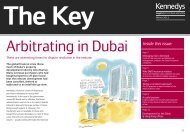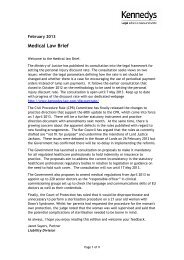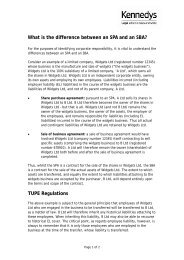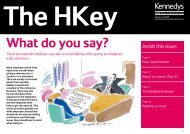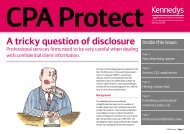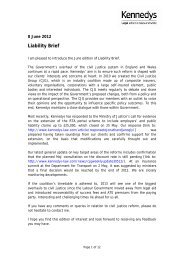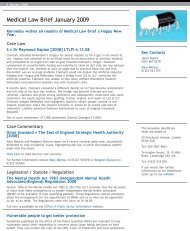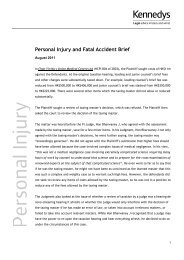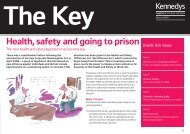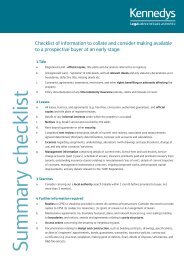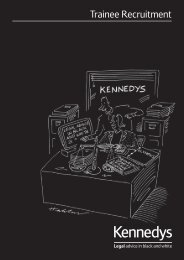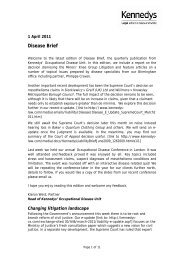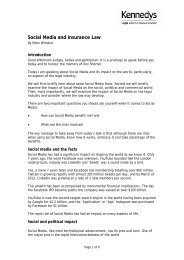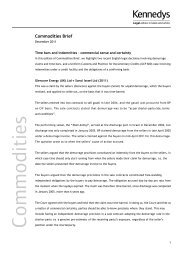Download Hong Kong Key - Summer 2009 (PDF, 256KB). - Kennedys
Download Hong Kong Key - Summer 2009 (PDF, 256KB). - Kennedys
Download Hong Kong Key - Summer 2009 (PDF, 256KB). - Kennedys
Create successful ePaper yourself
Turn your PDF publications into a flip-book with our unique Google optimized e-Paper software.
he used to acquire a controlling interest in Daido. As<br />
transaction had taken place.<br />
• Section 390 of the SFO imposed an accessory or<br />
Mr To’s appeal was therefore dismissed. His conviction<br />
security, TKR Finance held a charge over all the shares<br />
concurrent liability on an officer of a company that<br />
and fine of HK$50,000 were upheld. He was also<br />
acquired.<br />
The company secretary then told SEHK that none<br />
was found guilty of an SFO offence. So because<br />
ordered to pay the SFC’s investigation costs of<br />
of the directors had traded shares that day. He was<br />
Daido was liable, Mr To (as a director of Daido) was<br />
HK$15,166.<br />
In order to reduce Top Synergy’s exposure to the loan,<br />
TKR Finance’s director Victor Chan requested that Mr<br />
To reduce the debt by between HK$10m-HK$20m by<br />
selling some of the shares in Daido. A discussion then<br />
took place in July or August 2003 between Victor<br />
Chan and Mr To regarding the sale of approximately<br />
200 million shares. Mr To said that he could arrange<br />
for some of his friends to buy the shares. During a<br />
further discussion in early October 2003, Victor Chan<br />
again pressed Mr To to sell the shares in order to<br />
repay a portion of the loan and urged him to conclude<br />
the sale quickly, and preferably by the end of October.<br />
Share sale and non-disclosure<br />
On 16 October 2003, TKR Finance sold the 200<br />
million shares in Daido to three buyers. The proceeds<br />
of the sale were paid to TKR Finance the following<br />
day. However, Victor Chan did not immediately<br />
inform Mr To of the transaction. The sale of the 200<br />
million shares – as seen against the daily average of<br />
about 350,000 shares over the previous 10 days –<br />
attracted the attention of the SEHK.<br />
During the afternoon of 16 October, the company<br />
secretary was asked about the high turnover of<br />
Daido’s shares that day. He was specifically requested<br />
to ask all the directors whether any of them had<br />
bought or sold shares that day, and whether they<br />
knew of anything disclosable under the Listing Rules.<br />
When the company secretary asked Mr To, he replied<br />
that he did not trade any shares that day, and did not<br />
refer to the proposed sale of the 200 million shares<br />
he had previously discussed with Victor Chan. It did<br />
not occur to him to ask TKR Finance whether the<br />
asked to issue a public announcement to that effect.<br />
The announcement dated 16 October 2003 was filed<br />
with the SEHK, stating that Daido’s board of directors<br />
noted the large volume of share trading that day but<br />
did not know any reason for the increase in trading<br />
volume. The announcement was published on the<br />
website of the SEHK the same day.<br />
Dual filing<br />
Whenever a listed company files a copy of any<br />
announcement, statement or circular with the SEHK,<br />
it must make the same filing with the Securities and<br />
Futures Commission (SFC). The company may, by<br />
written authorisation, permit the SEHK to file any<br />
announcement, statement or circular on its behalf<br />
with the SFC. This is known as the “dual filing scheme”.<br />
Earlier that year, Daido had given the SEHK a blanket<br />
written authorisation to file any public announcement,<br />
statement or circulars with the SFC. However, on<br />
this occasion, the SEHK did not file the 16 October<br />
announcement with the SFC.<br />
Magistrates’ court ruling<br />
The first hearing was in the magistrates’ court. Mr<br />
Douglas TH Yau, the magistrate, came to the following<br />
conclusions:<br />
• Daido (via Mr To) knew – or should have known<br />
– that the sudden increase in the trading volume<br />
of its shares was the result of the sale of the 200<br />
million shares. Consequently, Daido was guilty of<br />
an offence under section 384(1) of the SFO for<br />
providing false or misleading information to the<br />
SFC.<br />
also criminally liable for the same offence.<br />
• Alternatively, even if the substantive offence under<br />
section 384(1) was not completed – that is to<br />
say, even if the 16 October announcement had<br />
only been given to the SEHK and not to the SFC –<br />
Daido would still be guilty of an attempt to commit<br />
the offence. Consequently, Mr To would also incur<br />
criminal liability by virtue of section 390.<br />
The appeal<br />
Daido and Mr To appealed to the Court of First<br />
Instance on various grounds. However, Madam<br />
Justice Beeson dismissed their appeal and upheld the<br />
magistrate’s decision on both the substantive and<br />
attempted offences. Mr To then appealed to the Court<br />
of Final Appeal, which reaffirmed the decision of the<br />
magistrate. The court made two important rulings:<br />
(1) As it had behaved recklessly, Daido would have<br />
been guilty of an attempt even if it had not<br />
been convicted of the full offence under section<br />
384(1).<br />
(2) An attempt to commit an offence is itself an<br />
offence under section 159H of the Crimes<br />
Ordinance. Mr To would have been criminally<br />
liable for Daido’s attempt to commit the section<br />
384(1) offence. This was due to the combined<br />
effect of sections 159H and 159G of the Crimes<br />
Ordinance, which modified section 390 of the<br />
SFO so as to impose an accessory or concurrent<br />
liability on a corporate officer for the company’s<br />
attempt to commit an offence under the SFO.<br />
The lessons of the case<br />
The criminal convictions of Daido and Mr To were the<br />
first successful prosecutions for providing false and<br />
misleading information under the dual filing scheme.<br />
The SFC’s executive director of enforcement, Mr<br />
Mark Steward, welcomed the decision and said: “The<br />
case provides authoritative confirmation that criminal<br />
prosecution is a real rather than theoretical risk. The<br />
decision will pave the way for more enforcement<br />
action, where appropriate, against listed companies<br />
and their directors who provide false or misleading<br />
information to the SFC or the SEHK”.<br />
The lesson to be learnt from this case is that not only<br />
can companies be convicted of attempting to commit<br />
an offence under the SFO, but that directors may also<br />
be found criminally liable for the same offence.<br />
Chris Sharrock<br />
Partner<br />
c.sharrock@kennedys.com.hk<br />
Jenny Zhuang<br />
Solicitor<br />
j.zhuang@kennedys.com.hk<br />
2



